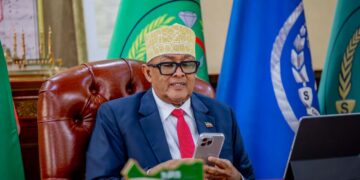In an escalation of its long-running conflict with the Jubaland regional administration, the Federal Government of Somalia (FGS) has instituted a complete ban on all flights to and from anywhere in Jubaland, effectively imposing an aerial blockade on the region, according to local airline sources. The move comes in the wake of a series of humiliating defeats for FGS-aligned forces in the region, including the routing of federal troops in the border towns of Ras Kamboni, Kulbiyow and Dolow, which forced them to seek refuge in neighboring Kenya.
The flight ban represents a significant escalation of the FGS’s campaign against Jubaland, which has already seen the deployment of troops to the region, the mobilization of clan militias, and the imposition of economic sanctions. It also marks a departure from the government’s previous policy of banning only flights to and from Jubaland that did not go through Mogadishu, which was itself a highly controversial and provocative move that drew widespread condemnation.
The FGS’s decision to escalate its confrontation with Jubaland in this manner has raised fears of a wider conflagration that could engulf the entire region, and has called into question the government’s commitment to dialogue, reconciliation, and the peaceful resolution of disputes. It has also underscored the deepening crisis of legitimacy and authority that afflicts the central government, as it struggles to assert its control over the country’s disparate regions and clans in the face of mounting resistance and opposition.
The Kulbiyow and Dolow Debacles
The FGS’s decision to impose a complete flight ban on Jubaland comes in the immediate aftermath of two stunning defeats for federal forces in the region, which have dealt a severe blow to the government’s prestige and authority. Yesterday, FGS-aligned troops were routed by Jubaland forces in the border town of Kulbiyow, forcing them to flee across the border into Kenya in a humiliating retreat that echoed a similar debacle in Dolow the same day.
In both cases, the FGS forces appear to have been outmaneuvered and outfought by their Jubaland counterparts, who were able to seize control of key infrastructure and strategic positions with relative ease. The fact that federal troops were forced to seek refuge in a neighboring country not once but twice in the space of 12 days has underscored the weakness and disarray of the FGS’s military apparatus, and has raised serious questions about its ability to project power and maintain control over the country’s vast hinterlands.
The Kulbiyow and Dolow debacles have also exposed the limits of the FGS’s strategy of relying on clan militias and other non-state actors to advance its interests in the region. While these groups have proven to be useful proxies for the government in its campaign against Jubaland, they have also shown themselves to be unreliable and often unpredictable partners, with shifting loyalties and agendas that do not always align with those of the central government.
An Escalation with Far-Reaching Consequences
The FGS’s decision to impose a complete flight ban on Jubaland represents a dangerous escalation of the conflict that could have far-reaching consequences for the region as a whole. The government is effectively isolating Jubaland from the rest of the country and the wider world, and is creating a humanitarian and economic crisis that could have devastating impacts on the lives and livelihoods of ordinary citizens.
The aerial blockade is also likely to further inflame tensions and exacerbate the sense of grievance and alienation that many in Jubaland feel towards the central government. The fact that the FGS has resorted to such extreme measures in the face of its military setbacks is likely to be seen as a sign of weakness and desperation, and could embolden those who oppose its rule to take even more aggressive actions in the future.
Moreover, the flight ban risks internationalizing the conflict in ways that could have unpredictable and destabilizing effects on the wider region. By imposing such a draconian measure on a region that borders both Kenya and Ethiopia, the FGS is effectively inviting those countries to become more directly involved in the crisis, either by providing support to Jubaland or by taking unilateral actions to protect their own interests and security.







